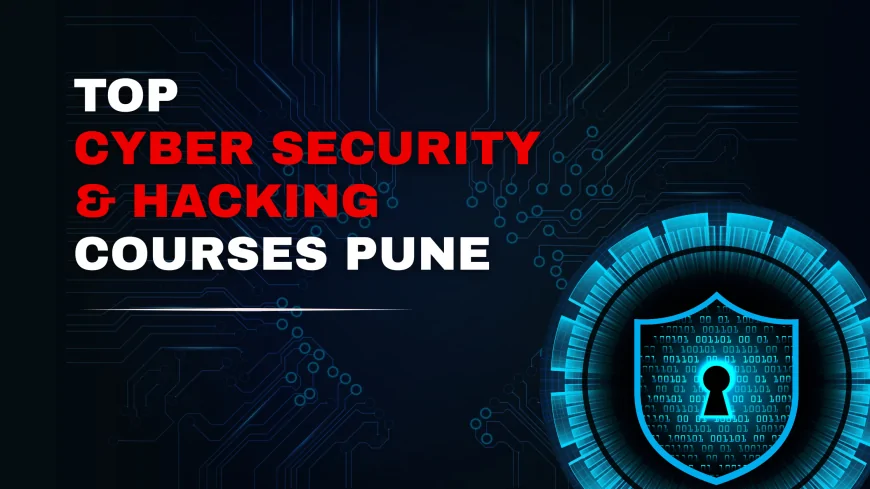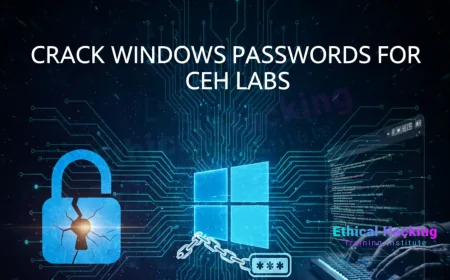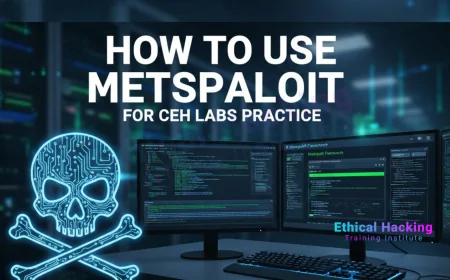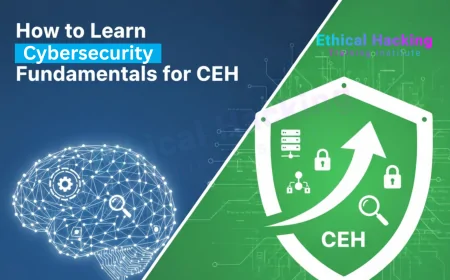Best Cyber Security and Ethical Hacking Courses in Pune 2025
Explore the top ethical hacking and cybersecurity courses in Pune. Learn skills, tools, and certifications to launch your cyber career in 2025 and beyond.

In an increasingly digital world, cybersecurity has become one of the most in-demand skill sets across industries. Whether it's protecting sensitive information, securing networks, or investigating data breaches, ethical hackers and cybersecurity experts play a critical role in modern IT infrastructures.
Pune, often referred to as the IT hub of Maharashtra, is not only home to a large number of tech companies but also a hotspot for learners aiming to master cybersecurity. This guide dives deep into the best hacking and cybersecurity courses available in Pune — highlighting course types, essential skills taught, certification options, and real-world value — all without favoring any specific institution.
Why Cybersecurity Training Matters More Than Ever
With cyberattacks becoming more sophisticated and frequent, companies are prioritizing their digital defense strategies. The demand for skilled ethical hackers and security professionals is soaring — making now the perfect time to build a career in cybersecurity.
Key reasons to learn ethical hacking and cybersecurity in 2025:
-
Rising cyber threats across industries
-
Lucrative career opportunities and high salary packages
-
Global certifications in demand
-
Possibility of remote and international roles
-
Skill-based and certification-driven hiring trends
Who Should Take a Cybersecurity Course?
Cybersecurity is not just for IT professionals. The following individuals can benefit greatly:
-
Freshers looking to enter a future-proof career
-
IT professionals seeking specialization
-
Network admins and system engineers who want to upskill
-
Developers interested in secure coding practices
-
Students pursuing tech degrees with an eye on ethical hacking
-
Freelancers and consultants entering the security field
Types of Cybersecurity Courses Available in Pune
Different learners have different goals — and Pune offers a diverse range of cybersecurity and ethical hacking courses tailored to those needs.
1. Foundation-Level Courses
These are ideal for beginners with no prior experience in IT or hacking. They focus on:
-
Basics of information security
-
Introduction to network protocols
-
Fundamentals of system vulnerabilities
-
Legal and ethical aspects of hacking
2. Certified Ethical Hacking (CEH)-Aligned Courses
These mimic the curriculum of global certifications like CEH and focus on:
-
Reconnaissance and footprinting
-
Scanning and enumeration
-
Gaining access and privilege escalation
-
Malware analysis and social engineering
3. Advanced Penetration Testing Courses
Suited for intermediate and advanced learners:
-
Web application exploitation
-
Wireless security
-
Bypassing firewalls and IDS
-
Red teaming and threat emulation
4. Cybersecurity with SOC & SIEM Tools
Focusing on modern enterprise security operations:
-
Security Operation Center (SOC) structure
-
Threat detection and SIEM tools like Splunk
-
Incident response and digital forensics
-
Hands-on log analysis and real-time monitoring
5. Bug Bounty and Web App Hacking Programs
Designed for those interested in freelance security testing:
-
OWASP Top 10 vulnerabilities
-
Bug bounty platforms and methodologies
-
Client-side vs server-side attack vectors
-
Report writing and disclosure ethics
Key Features to Look for in a Cybersecurity Course in Pune
Not all courses are created equal. The best programs often offer a unique combination of the following:
Hands-on Labs and Simulations
Courses that include real-world lab environments and virtual machines are crucial. Practical training bridges the gap between theory and application.
Mentorship and Doubt Support
Look for training providers that offer 1-on-1 mentoring, discussion forums, and live Q&A sessions to reinforce concepts and clear doubts.
Capstone Projects or Red Team Exercises
Advanced courses may feature end-to-end attack simulation projects to test your knowledge across multiple tools and attack chains.
Industry-Aligned Curriculum
Make sure the course content maps to real-world job roles like:
-
Penetration Tester
-
SOC Analyst
-
Cybersecurity Consultant
-
Information Security Analyst
-
Application Security Engineer
Flexible Learning Modes
Options may include:
-
Classroom-based
-
Live online instructor-led
-
Pre-recorded, self-paced modules
-
Weekend or evening batches for working professionals
Essential Skills Taught in Top Cybersecurity Courses
Here's what you’ll typically learn:
| Skill Area | Topics Covered |
|---|---|
| Networking | TCP/IP, DNS, DHCP, firewalls, NAT, routing |
| Linux Fundamentals | Bash, file permissions, scripting, process management |
| Hacking Tools | Nmap, Metasploit, Burp Suite, Wireshark |
| Web Security | SQL injection, XSS, CSRF, session hijacking |
| System Security | Password attacks, privilege escalation, backdoors |
| Cloud Security | AWS/Azure misconfigurations, IAM roles, S3 bucket flaws |
| Malware Analysis | Static/dynamic analysis, RATs, trojans, keyloggers |
| Incident Response | Log analysis, chain of custody, forensic tools |
Certifications You Can Prepare For
A good cybersecurity course should prepare you for certifications such as:
-
CEH (Certified Ethical Hacker)
-
CompTIA Security+
-
OSCP (Offensive Security Certified Professional)
-
CHFI (Computer Hacking Forensic Investigator)
-
CISSP (for senior-level professionals)
Each of these has unique prerequisites, difficulty levels, and industry value. Choose according to your current skill level and career goals.
What Makes a Course Stand Out? Key Differentiators
If you're trying to choose between multiple programs, consider these unique points:
Internship and Placement Support
Programs that offer internships or connect you with hiring partners significantly increase your chances of employment.
CTF Challenges and Competitions
Some courses include Capture The Flag (CTF) challenges to sharpen your skills in a gamified way.
Live Cyber Range Environments
Top-tier courses simulate real-time cyber attacks for hands-on red/blue team exercises.
Peer Networking & Community
A strong student/alumni network, Discord groups, and live events can help you grow long after the course ends.
Career Path After Completing a Cybersecurity Course
Cybersecurity is not a single-role career. After completing your training, here are some potential roles:
-
Ethical Hacker / Pen Tester
-
Security Analyst
-
Threat Hunter
-
SOC Engineer
-
Malware Analyst
-
Application Security Tester
-
Cybersecurity Consultant
With time, you can progress to roles like:
-
Security Architect
-
Red Team Lead
-
Chief Information Security Officer (CISO)
Estimated Duration and Pricing
While costs and timeframes vary widely, here’s a general idea:
| Course Type | Duration | Estimated Fee Range (INR) |
|---|---|---|
| Beginner Courses | 1 – 2 months | ₹10,000 – ₹20,000 |
| Intermediate Certification | 2 – 3 months | ₹25,000 – ₹40,000 |
| Advanced Penetration Testing | 3 – 6 months | ₹40,000 – ₹80,000 |
| Full Stack Cybersecurity | 6 – 12 months | ₹70,000 – ₹1,50,000 |
Tip: Look for EMI options, scholarship programs, or bundle discounts.
How to Choose the Right Course for You
Ask yourself:
-
Do I need a beginner or advanced course?
-
Am I aiming for a job, freelance career, or certification?
-
Do I prefer live classes or self-paced learning?
-
What tools and skills do I want to master?
Make a checklist and match it with the course curriculum, outcomes, and reviews.
FAQ's
What is the best ethical hacking course for beginners in Pune?
Beginner-friendly ethical hacking courses in Pune typically cover fundamentals like networking, system security, and basic hacking tools. Look for hands-on labs, real-world projects, and guidance from experienced mentors. These programs lay a strong foundation for future certifications and career growth in cybersecurity.
Are ethical hacking courses in Pune suitable for non-IT students?
Yes, many courses are designed for learners without a formal IT background. They start with the basics of computer networks, Linux, and cybersecurity principles, gradually building up to practical hacking techniques. With the right support, non-IT students can succeed and transition into cybersecurity roles.
How long does it take to complete a cybersecurity course in Pune?
The duration varies based on the course level. Beginner programs can be completed in 1–2 months, while advanced certifications may take 3–6 months. Full-stack cybersecurity tracks may run for up to a year, especially if they include internships and placement support.
What skills will I learn in a hacking and cybersecurity course?
You’ll learn network scanning, vulnerability analysis, password cracking, malware detection, penetration testing, and web app security. Many courses also teach ethical practices, digital forensics, and defensive strategies using real-world tools like Nmap, Metasploit, Burp Suite, and Wireshark.
Are ethical hacking courses in Pune available online?
Yes, most cybersecurity training providers in Pune offer both online and offline formats. Online courses often include live instructor-led classes, recorded videos, virtual labs, and mentor support — making it convenient for working professionals or outstation students.
Do cybersecurity courses in Pune offer internships?
Some advanced programs include internship opportunities with cybersecurity firms or simulation-based projects. These internships provide valuable real-world experience and improve employability by helping you apply theoretical knowledge in practical scenarios.
What is the career scope after completing an ethical hacking course?
After completing a course, you can apply for roles like Ethical Hacker, Security Analyst, SOC Engineer, Penetration Tester, or Cybersecurity Consultant. With experience, you can progress to positions such as Security Architect or Red Team Lead.
Do ethical hacking courses help in clearing certifications like CEH or OSCP?
Yes, many courses are aligned with global certifications like CEH (Certified Ethical Hacker), OSCP, and CompTIA Security+. They offer exam-focused training, practice questions, and hands-on labs to prepare you for certification success.
How much does an ethical hacking course in Pune cost?
The cost typically ranges from ₹10,000 to ₹80,000 depending on course level, duration, mode (online/offline), and included features like live labs, mentorship, or internships. Many programs also offer EMI options or bundle discounts.
Can I get a job after completing a cybersecurity course in Pune?
Yes, if you complete a skill-based course with practical labs and project work, you can become job-ready. Many students land roles as SOC analysts, junior pen-testers, or security interns after completing certified programs with placement support.
What tools are taught in ethical hacking courses?
Courses often cover tools like Nmap, Wireshark, Metasploit, Burp Suite, John the Ripper, Hydra, SQLmap, and Kali Linux. Learning how to use these tools for scanning, exploitation, and vulnerability detection is a core part of the curriculum.
Is placement support available after completing the course?
Some courses in Pune offer dedicated placement support, resume preparation, mock interviews, and job referrals. Choosing a program with a strong placement record can significantly improve your job prospects in the cybersecurity field.
Can I pursue ethical hacking part-time while working?
Yes, many courses are designed with flexible schedules — including weekend or evening batches. Online formats also allow working professionals to balance their job while gaining cybersecurity skills on the side.
What background is required to join a cybersecurity course?
A basic understanding of computers is helpful, but many courses start from scratch. If you’re already familiar with networking or programming, you may grasp advanced concepts faster, but beginners can still excel with the right guidance and practice.
Are there cybersecurity courses specifically for students in Pune?
Yes, there are specialized programs for college students that blend academic knowledge with hands-on training. These courses often align with career paths and certifications, making it easier for students to transition into the job market after graduation.
What is the difference between ethical hacking and cybersecurity?
Ethical hacking focuses on offensive security — finding and exploiting vulnerabilities like a hacker to strengthen defenses. Cybersecurity is a broader field that includes defensive strategies, policies, encryption, risk management, and incident response. Many courses teach both.
Do Pune-based courses offer real-time lab access?
Top cybersecurity courses provide access to cloud-based or local labs where students can practice in real-world simulated environments. This hands-on practice is crucial for understanding attack techniques and building confidence.
Can I join a cybersecurity course right after 12th grade?
Yes, some foundation-level courses accept students right after 12th. These are designed to build core IT and cybersecurity skills from the ground up, setting the stage for further certifications or academic degrees in the field.
Are there bug bounty courses available in Pune?
Yes, some cybersecurity programs include modules on bug bounty hunting, teaching students how to find vulnerabilities in web applications and submit reports to platforms like HackerOne or Bugcrowd. These can lead to freelance earnings and recognition.
What kind of certification do I receive after completing the course?
Most ethical hacking courses provide a course completion certificate. Some also prepare you for international exams like CEH, OSCP, or CompTIA Security+, which are recognized globally and can greatly enhance your resume.
Final Thoughts
Cybersecurity is a high-growth field with endless possibilities, and Pune offers an ideal ecosystem for aspirants — thanks to its tech-driven job market, diverse training options, and strong community of learners.
Whether you're a student, job switcher, or IT pro, there's a path for you in ethical hacking and cybersecurity. Choose a course that aligns with your goals, offers hands-on practice, and prepares you for the future of digital defense.
What's Your Reaction?
 Like
0
Like
0
 Dislike
0
Dislike
0
 Love
0
Love
0
 Funny
0
Funny
0
 Angry
0
Angry
0
 Sad
0
Sad
0
 Wow
0
Wow
0

















